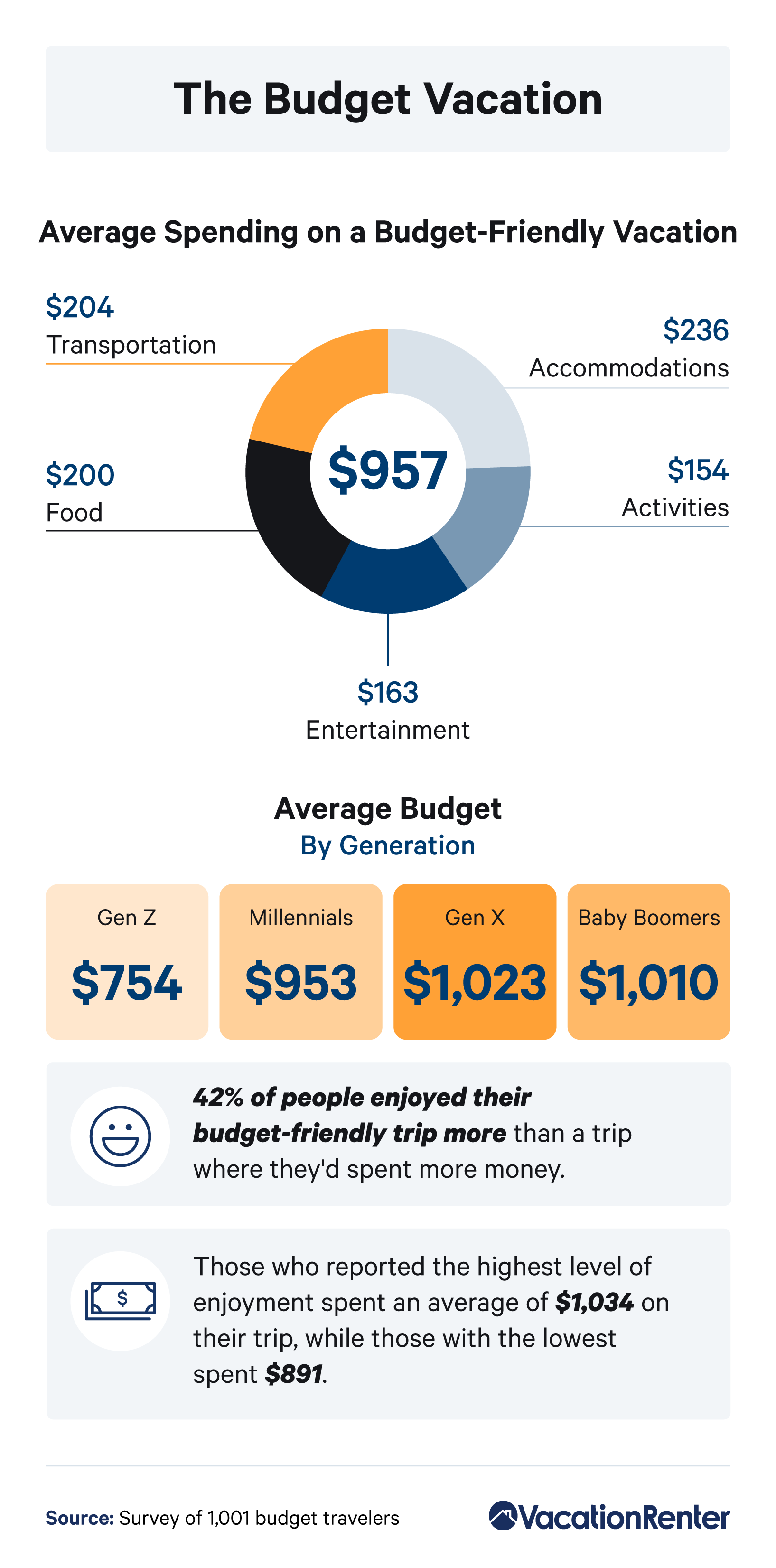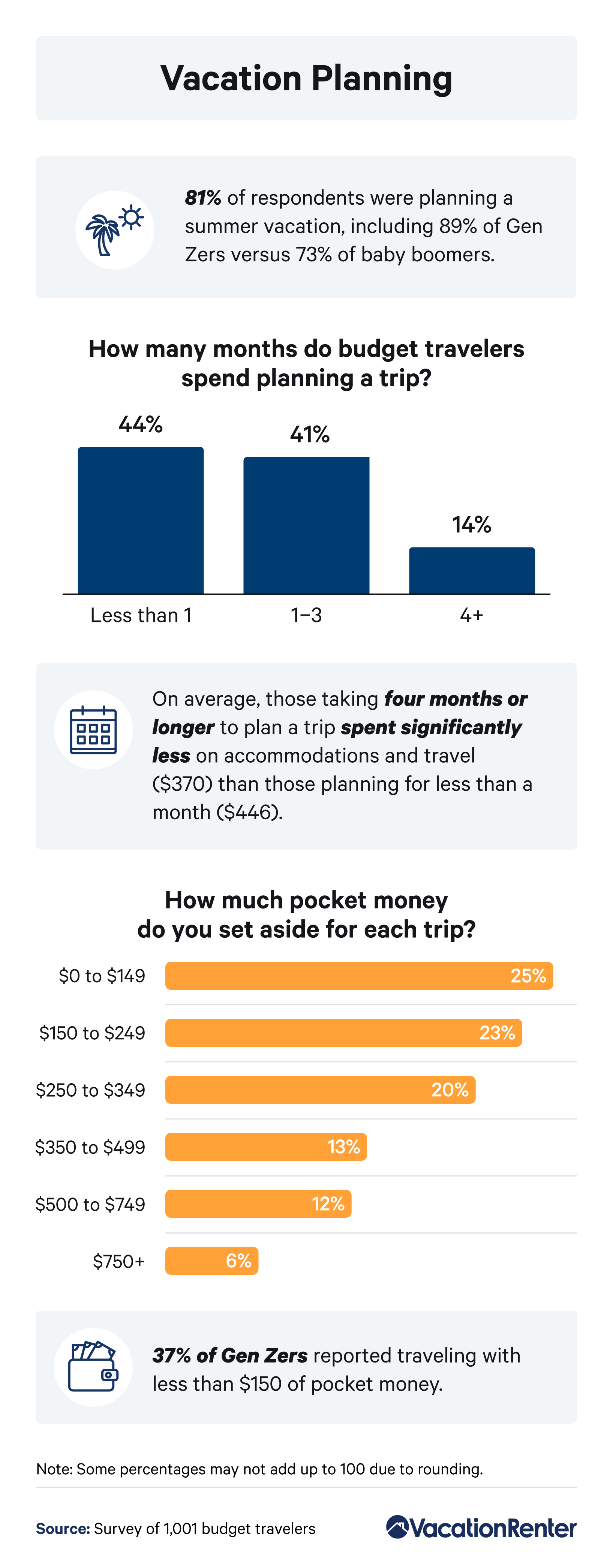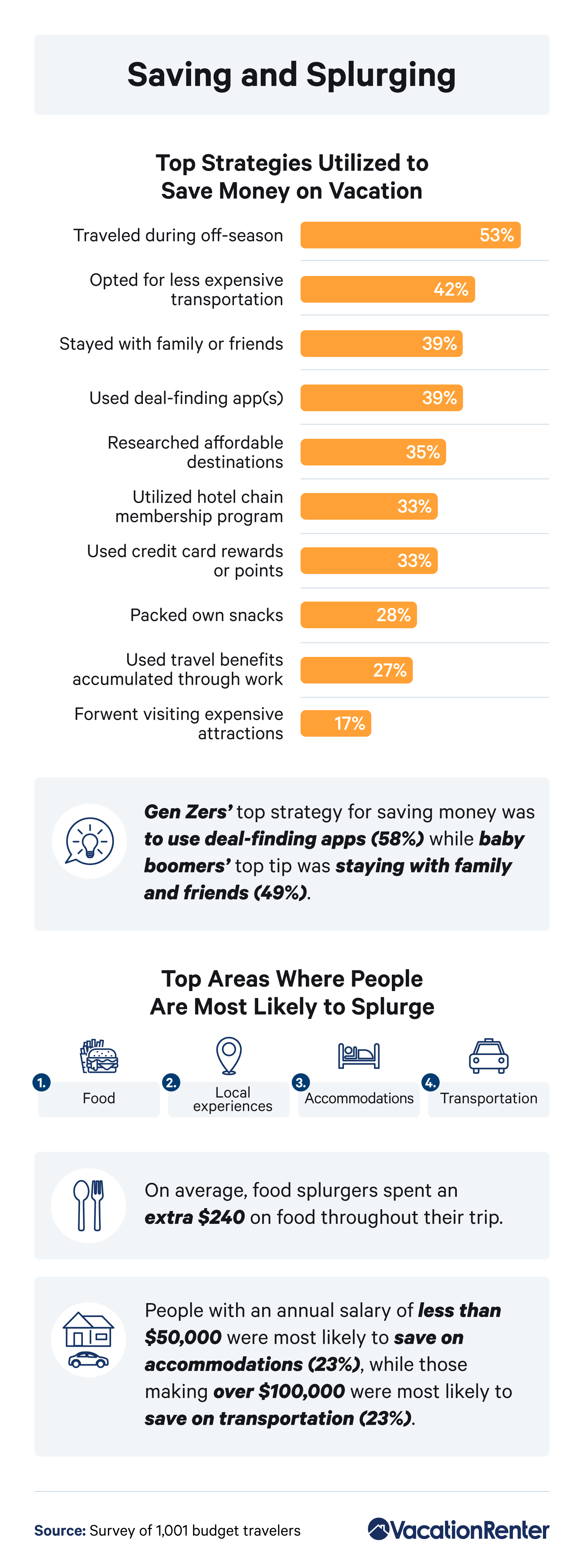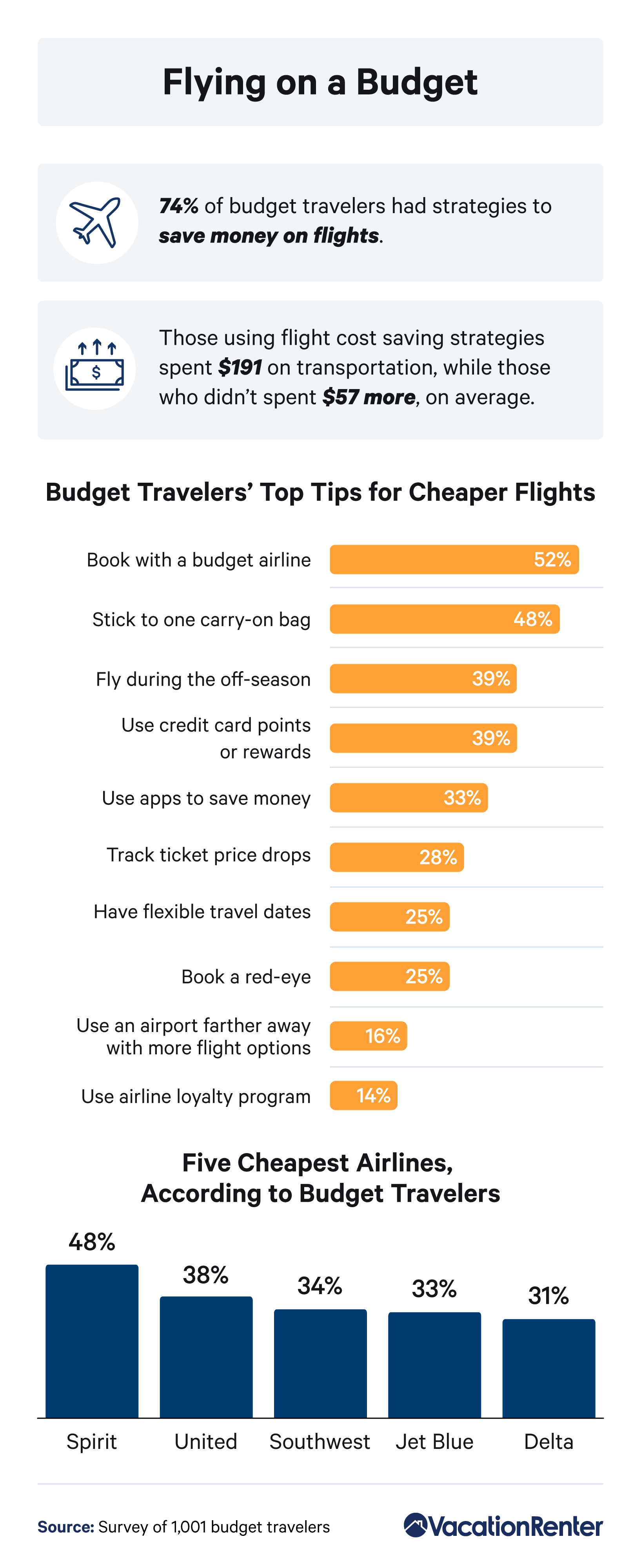“Budget travel” is an oxymoron in more ways than one. Firstly, while the word “budget” is synonymous with affordability, travel is expensive for many people — especially in the midst of increasing gas prices. Secondly, the term suggests a lack or restriction of possibilities, but new research shows that, yes, these wallet-friendly trips may actually lead to higher levels of enjoyment than the most lavish of vacations.
Key Takeaways
- 37% of Gen Zers travel with less than $150 of pocket money.
- When splurging on vacation, 35% of travelers chose to spend extra on food.
- 42% of people had a better time on a budget-friendly vacation than one for which they spent more money.
After speaking to more than 1,000 self-described “budget travelers” — or those who agree that spending $1,500 or less per vacation is “budget-friendly” — the team at VacationRenter has officially unearthed the secrets to a highly successful budget travel experience. Vacationers shared their expenses, what they felt was worth the splurge, and their top tips for saving money while still maximizing trip satisfaction.
Cost Breakdown for Budget Travel
When taking a look at the most affordable ways to travel, it’s prudent to look at the budget breakdown of travelers themselves. The first thing respondents shared was how they spent their money on a budget-friendly vacation, with expenses categorized by accommodations, transportation, food, activities, and entertainment. Responses were then compared by generation below.

Even intensely budgeted travel does not come free, and it isn’t necessarily cheap. Self-described “budget travelers” were still spending nearly $1,000 on their trips — or $957, on average. This was primarily going toward accommodations ($236) and transportation ($204) which leaves just $154 for activities and $163 for entertainment. When it comes to transportation, distance traveled is a large factor in those costs. 57% of our budget travelers went out of state, 32% stayed in-state, and 11% visited another country.
Generally speaking, the older a respondent was, the more money they spent on their vacation — perhaps because people typically earn more later in life. It was impressive to see that Gen Zers managed to travel with an average bill of just $754 total (compared to Gen Xers, who spent an average of $1,023). As we will see later in this study, members of this digitally native generation have a few tech-savvy tips up their sleeves for saving money on travel. It’s also worth noting that Gen Zers may be spending less on their vacations because they have less to spend than other generations.
Planning for Budget Travel
Planning ahead has been proven to help people save on everything from travel and weddings to retirement. In addition to saving time and money, it can also ensure that everyone gets to see and do what they want while on vacation. The next section of research looked at the ways budget travelers plan ahead and financially prepare for their adventures.

81% of budget travelers planned on taking another trip in the summer of 2022. This number increased to 89% for Gen Zers and 83% for millennials. However, it decreased to 78% for Gen Xers and 73% for baby boomers. While 14% of travelers said they would take four months or longer to plan, those who did take this amount of time spent significantly less on travel and accommodations. This was likely due not only to cheaper advance fares but also to extra time to compare rates and destinations.
Many respondents also set aside pocket money for unplanned expenses on the trip. Most often, this amounted to just $149 or less, especially for Gen Zers, who may be traveling on a stricter budget to begin with.
Tips for Saving and What’s Worth the Splurge
Whether your focus is spending less on accommodations, transportation, or even vacation activities, people are always looking for and comparing ways to save. Not simply planning, but strategically planning, will ultimately be what enables a traveler to save the most money. This section of our study asked respondents for their top tips for a budget-friendly, yet still enjoyable, vacation.

Budget Tip #1: Travel During Off-Season
If you’re looking to travel to your dream destination while still saving major bucks, consider visiting during the off-season. This was the top tip suggested by experienced budget travelers, with more than half recommending it. Off-peak travel can help you save on accommodations, rental cars, restaurants, and tours — although you may experience less than ideal weather and reduced opening hours for local attractions.
Budget Tip #2: Stay with Friends and Family
If the thought of vacationing in the rain isn’t your idea of a good time — or if you’d like to save even more money — baby boomers were quick to recommend staying with friends and family.
Budget Tip #3: Use Deal-Finding Apps
If you’re in the mood to get a little further away from everyone, Gen Zers had a more tech-savvy tip, which was to use deal-finding apps. Apps can help you save on flights, restaurants, and everything in between. Credit card points offered another opportunity to save, which millennials were most likely to recommend.
Even self-described budget travelers were willing to splurge in certain circumstances, however. By far, our respondents were most likely to do so on food (35%). On average, these food splurges totaled more than $240 — significantly more than most had saved in pocket money for the trip.
Budget-Friendly Air Travel
One of the big-ticket items travelers typically shop around for is flights. The cost of a plane ticket can quickly eat away at an already meager budget, especially with gas prices being what they are today. As such, many people were willing to hop on a red-eye flight or endure a long layover to save money. This last section of this study asked respondents how they fly while still respecting their budget.

Budget travelers were generally highly strategic: nearly 3 out of 4 agreed that they did have a strategy in place specifically for flying. The few who didn’t lost out on an average savings of $57 on the flight alone. On average, strategic flyers spent $191 on transportation.
The top suggestion from budget fliers was to book with a low-cost airline. While these may not have the frills of a higher-end airline, they are effective in helping travelers reach their cost-saving goals. Most often, people recommended Spirit Airlines for this type of journey. 48% of respondents also suggested sticking to one carry-on bag, likely due to the fact that most budget airlines charge an additional fee for luggage. And yet again, opting for off-season travel was another top pro tip.
Making Affordable Trips Enjoyable
In an era of unprecedented expenses, it’s encouraging to see that people still believe in the possibility of traveling without breaking the bank. The experienced budget travelers we surveyed were able to get plenty of enjoyment out of their adventures, even after spending less than $1,000 in total. Gen Zers, who often relied on apps and tech to save, managed to enjoy their journeys for under $800. All generations agreed that off-season travel was the single best way to save money.
VacationRenter provides travelers of all budgets, tastes, and interests the chance to plan and book the trip of their dreams. If you’re feeling inspired to book your next great vacation, head to VacationRenter.com to start planning today.
Mentioned In This Article
- Record-breaking gas prices could be here to stay—here’s what a gallon might cost you this summer
- The First Generation of True Digital Natives
- Gen Z is going to have a hard time getting rich
- 35% of Americans Plan to Travel More in 2022. Here’s How to Make it More Affordable
- The Best Time to Book a Flight for Domestic, International, and Summer Travel
- Best Apps for Finding Cheap Flights
Methodology and Limitations
We used Amazon Mechanical Turk to collect 1,001 responses from budget travelers in the United States. We categorized budget travelers as people who spend less than $1,500 on a trip. 12.4% of our participants were baby boomers, 27.4% were Gen Xers, 49.6% were millennials, and 10.6% were Gen Zers. Those who failed an attention-check question were disqualified. The data we are presenting relies on self-report.
The data we are presenting rely on self-report. There are many issues with self-reported data. These issues include, but are not limited to, the following: selective memory, telescoping, attribution, and exaggeration.
Fair Use Statement
Starting to feel the budget travel bug? If you want to convince others to join you on your trip, or help them find a destination of their own, you’re welcome to share this research. Just be sure your purposes are noncommercial and that you link back to this page.